Learn more about taking action
Learn more about Mason's climate commitments
A look into the future of the university and its sustainability through the eyes of young leaders, activists, and researchers in the Honors College
“We’re in a moment now, when young people are really starting to step up and see what’s at stake for them and their future.”
Beverly Harp, Honors College alumna
Beverly Harp is an Honors College alumna known for her commitment to climate change issues during her time at Mason. She started her activism at sixteen, before it became the widely publicized issue that it is now. “Five years ago at Mason’s campus [climate activism] was not happening. And I think also just not happening anywhere. It definitely gives me a lot of hope.”
Today, she is advocating for climate action and organizing like-minded youths through an organization called SustainUS.
Beverly’s focus? The World Bank, which invests billions in active fossil fuel finance and has not seen enough youth advocacy on climate change.
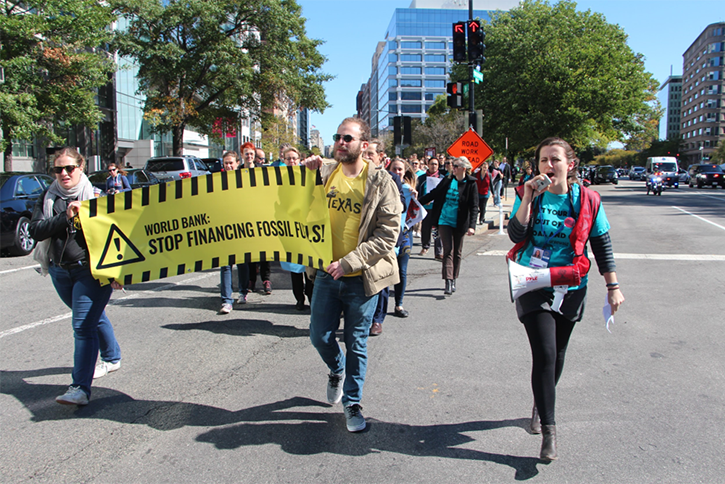
Honors College alumna Beverly Harp participates in a climate rally in Washington, D.C. Photo courtesy of Beverly Harp.
“Basically the program is: we train a group of ten young people on climate policy, international climate policy, finance, organizing, storytelling, leadership, equity issues, and bond as a community, as a group until we’re reading to go into meetings and basically confront officials throughout the week on their failure to act on climate change and take it seriously.”
The scientific definition of climate change is a rise in mean global temperatures due to an increased concentration of greenhouse gases — like carbon dioxide from the burning of fossil fuels — in the Earth’s atmosphere. But climate change means much more than that to activists.
“[Climate change] represents to me a really scary symptom of what is broken in the world and more immediately it represents to me the people and places that I am scared for. [I] spent a lot of time studying and living in India, and those are the friends and the host families who are on the frontlines of the crisis. And my family who are in Jersey — the Jersey Shore — they’re really concrete people and places that keep me rooted in the urgency of the crisis,” says Beverly.
With the constant worry, the best advice Beverly has is to not go in alone.
“Finding a good group of people you like […] to do this work with is crucial, or else it’s disheartening and scary.”
“We’ve become a culture of getting as much as possible and greed has heavily become a value in our society. So, climate change is reflective of that to me.”
Sara Babcock, Honors College senior
Strength in numbers is a familiar concept to current Honors College student Sara Babcock, who has been busy fostering a community of activists through her leadership roles and membership in green groups.
Sara summarizes how the climate crisis connects to what she perceives as broader trends of consumerism and greed: “It’s just a failure on humans’ parts because climate change is largely anthropogenic, so human-caused […] In the process of industrial revolution and becoming a more advanced society — especially in the United States — we’ve become a culture of getting as much as possible and greed has heavily become a value in our society. So, climate change is reflective of that to me.”
A senior Environmental and Sustainability Studies major, Sara is President of Alpha Kappa Chi, a coeducational environmental fraternity. She also is Student Government’s Undersecretary of Sustainability, a member of both Mason’s Environmental Justice Alliance and Green Patriots. Her involvement helps her see the full range of ways that the Mason community engages in environmental advocacy, which is what made her an ideal guest speaker at the Fridays for Future climate rally on Friday, October 18, 2019 on the Merten Hall lawn. She spoke in her role as Undersecretary of Sustainability on the future she would like to see Mason set its aspirations to, including carbon neutrality by 2050.
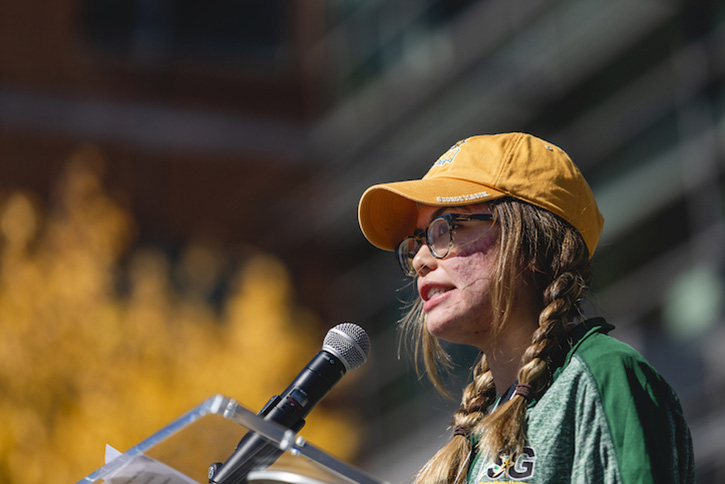
Sara Babcock, Executive Undersecretary for Sustainability with Student Government, speaks during the Fridays for Future climate rally. Photo by Lathan Goumas.
“We asked for a new climate action plan, we asked for Mason to join the University Climate Change Coalition, or UC3, and then we asked for Mason students to kind of keep climate action in mind moving forward so we can create a climate of sustainability on campus — a culture of sustainability.”
She would like more students outside of the environment and sustainability majors to get involved with the movement, and says all they need to do is reach out: “if you’re not part of that major or part of an organization that focuses on [environment] it’s really easy to just not know what’s going on.”
Additionally, she would like to see Mason engage on the issue and become a “microcosm of change.” The university has on multiple occasions committed to track its sustainability, phase-in renewable energy, and become carbon neutral, but a lack of transparency is a major concern for activists.
“I’d like to see the university put those words into action. And it’s kind of hard because a lot of what the administration does isn’t very transparent and so it’s hard to see things that they’re doing, but with the climate action plan, that’s something tangible that they can do.”
“Whenever people think about climate change and person-to-person engagement on sustainability issues, they usually think of me for some reason.”
Ben Rhoades, Honors College senior
Another point-person on campus for climate action, Ben Rhoades knows firsthand how difficult it is for the university administration to make that crucial change.
“Whenever people think about climate change and person-to-person engagement on sustainability issues, they usually think of me for some reason,” jokes Ben, a senior Environment and Sustainability Studies major. The reason is likely his evergreen presence at activist events like protests against the Mountain and Atlantic Coast Pipelines.
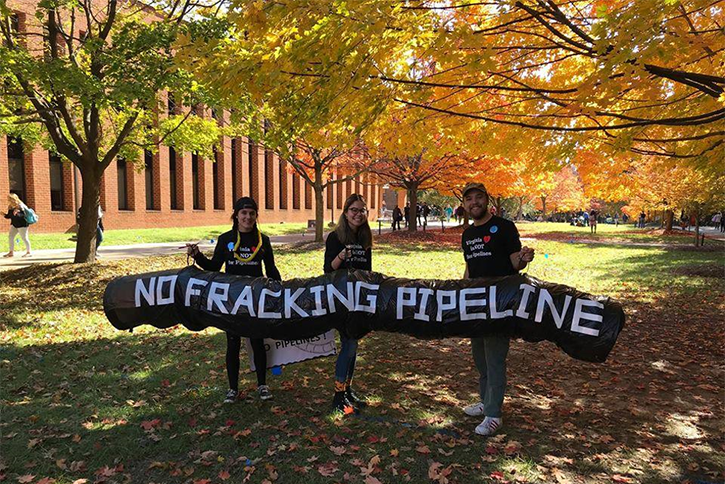
Seniors Sara Babcock (middle) and Ben Rhoades (right) protest fracking pipeline construction in Virginia. Photo courtesy of Sara Babcock.
But Ben has also worked behind-the-scenes on climate action here at Mason. In fall of 2018, he and a group of students from Dr. Dan Sklarew’s EVPP 480 class sat down with then-President Cabrera to talk climate action plans and carbon neutrality.
The goal was to get Cabrera to recommit the university to a standard framework on climate action. President Merten’s 2007 climate action plan stated Mason would be carbon neutral, or net zero emissions by 2050 — but the proof of action fell short. According to Ben, reports by the American Association of Higher Education Climate Emissions say, “we are nowhere near on track for carbon neutrality by 2050 and we were [at the time] increasing our carbon emissions.”
Unfortunately, there were no short-term deliverables coming out of that meeting aside from the creation of the Mason Sustainability Council.
Ben summarizes his disappointment with the administration’s follow-through on this issue, “it’s been half of a year almost, since then, and there have been no university-wide announcements about a climate action plan or a new framework that the university is going to be committing to [in order] to achieve carbon neutrality. So, long story short, we met with the president of the university at that time, and nothing really came of it.”
At the Fridays for Future climate rally, Ben spoke about how his own consciousness of climate change began and why Mason students should care. What’s important is for Mason students to see themselves as advocates for justice, and to “keep climate change at the forefront of our political consciousness — [because] it can be an easy issue to relegate to lower rungs as a political issue.”
Ben says the first steps for someone who wants to get involved in climate action is to ask questions and join a student organization like Mason Environmental Justice Alliance and Green Patriots or an outside coalition.
“Everyone that can should join a club or movement or some organization trying to combat climate change, and educate themselves on what they can do in university, what the university can do, [and] what [the] government can do to combat climate change — and advocate for that.
“I think that to me climate change just sort of signifies this tragedy that we’ve been having for the past hundred years where we’ve just cared more about profit than we’ve cared about the planet.”
Emma Gregory, Honors College senior
Senior Environmental Science major Emma Gregory is an example of what advocacy and meaning can look like outside of what is happening here at Mason.
“My whole life revolves around the environment,” remarks Emma, noting a campus clean-up she planned to rush off to after her interview.
To her, climate change is a rallying cry for an entire generation.
“The scientist in me would sort of spit out the definition of climate change, but I think that to me climate change just sort of signifies this tragedy that we’ve been having for the past hundred years where we’ve just cared more about profit than we’ve cared about the planet.”
President of Mason Environmental Justice Alliance, e-board member of Alpha Kappa Chi, and Alternative Transportation Intern for the Office of Sustainability, Emma believes in the power of getting involved. She’s currently planning an Environmental Justice Summit for students throughout the state of Virginia. “I think it's up to you to sort of take action on the issues that you want to and sort of live as a role model for others to do that as well.”
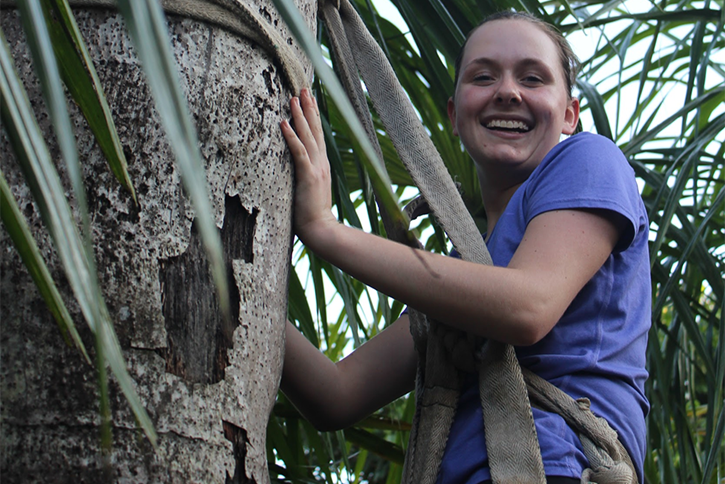
Senior Emma Gregory climbs a palm tree with the Conservation and Sustainability of the Amazon Rainforest study abroad program in the village of Sucusari in Iquitos, Peru. Photo courtesy of Emma Gregory.
In January 2019, Emma studied abroad in Peru to learn about conservation and sustainability issues like deforestation and climate adaptation from the Maijuana tribe in the Amazon rainforest. The hands-on experience connected her knowledge of environmental justice issues with a global perspective.
“I think programs like that are essential for helping students actually see and translate what they’re learning in the classroom into real life.”
“I think it is really valuable to read economic perspectives that maybe say, ‘here’s a different way to conserve resources we hadn’t thought about before.’”
Molly Harnish, Honors College senior
Honors College senior Molly Harnish is involved with the issue of climate change in a different way — she looks at the economics.
“Economics, the study of incentives and choice, has a lot to say — the whole thing is about how we use scarce resources, right? And environmental resources are scarce, and getting scarcer. And so it’s definitely an economic question, but it’s also a political one, because we're political animals and we’re interacting with this issue and it is kind of a question of what policies make the most sense economically but also which are we actually going to be able to implement in political terms.”
Molly was inspired to research environmental economics after a trip to the Cherokee National Forest in Tennessee challenged what she thought she knew about privatization.
“I read this plaque by the U.S. Forest Service and it said that this forest was privately owned and it was completely deforested and everyone used it for logging […] during the late 19th century, and that’s not really how econ[omics] thinks about resource conservation.”
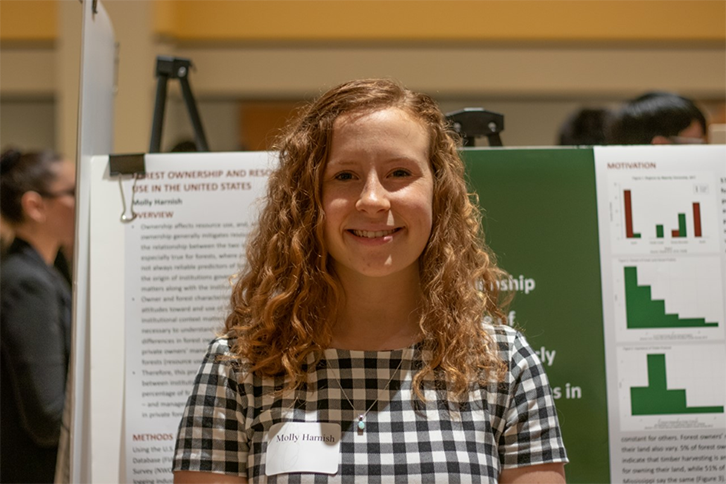
Senior Molly Harnish presents her Honors 361 research proposal at the Honors College Fall Research Poster Exhibition. Photo by Joshua McLean.
During her internship with the Federal Reserve Bank of Richmond last summer, Molly dove into the topics of climate change, economic risks, and how different central banks were responding to the potential financial instability that would come with them. Her article “Central Banks and Climate Risks” can be found in the Second/Third Quarter 2019 Econ Focus, an official publication of the Federal Reserve Bank of Richmond covering economic issues affecting the Fifth Federal Reserve District and nation.
When asked about what climate change means, Molly replied, “I think it's a really good demonstrator of how people value the present a lot more than they value the future.”
Currently, Molly is working on her undergraduate economics thesis, which looks into how different styles of management work to achieve the goal of resource conservation. Her research considers the idea of incentives and the ways that different property rights of environmental resources affects how people use them. She elaborates that resource conservation is complicated; it’s dependent on the type of resource, politics, and institutions involved.
“I think it is really valuable to read economic perspectives that maybe say, ‘here’s a different way to conserve resources we hadn’t thought about before.’”
In her Honors 361 Multidisciplinary practicum course taught by Mr. Richard Todd Stafford, Molly constructed a research proposal focusing on forest ownership and resource use in the United States. Her thesis will be a case-study on Florida, specifically. She also presented her proposal at the Honors College Fall Research Poster Exhibition on December 6th, 2019.
The bottom line is that to tackle climate change, Mason needs to be the ‘brave and bold’ self it encourages in its students, says Beverly.“[We need] Mason to be bold and invest in solar, and be bold and lead in how we as an institution contribute to climate change. And also [to] be bold in our financial relationships with Koch Industries and these funders who we know are actively working to make these problems worse.”
Mason students of all disciplines are crucial in this transition.
“We’re not impacted by climate change in the same way as people who don’t have access to a healthy earth are impacted by climate change. I think that we have an obligation to, despite not having these issues at the forefront of our daily lives, [to] think about them daily and consider them as [important],” notes Ben.
After graduating, Sara plans to continue her work in environmental justice by becoming a lawyer, Emma hopes to do community outreach or communications for an environmental nonprofit, Ben would like to work in the restoration of ecological systems, and Molly plans to pursue a PhD in environmental economics.
Feature story by Honors College Multimedia Communications Intern Sophia Chapin
